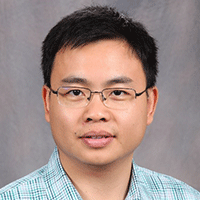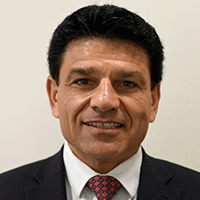
Monday, July 15, 9:05am - 10:05am
Le Xie, Ph.D.
Segers Family Dean's Excellence Professor in Engineering
Texas A&M University
Keynote Title: Energy System Digitization in the Era of AI: A Three-Layered Approach Toward Carbon Neutrality
Abstract: The transition toward carbon-neutral electricity is one of the biggest game changers in addressing climate change since it addresses the dual challenges of removing carbon emissions from the two largest sectors of emitters: electricity and transportation. The transition to a carbon-neutral electric grid poses significant challenges to conventional paradigms of modern grid planning and operation. Much of the challenge arises from the scale of the decision-making and the uncertainty associated with the energy supply and demand. Artificial intelligence (AI) could potentially have a transformative impact on accelerating the speed and scale of the carbon-neutral transition, as many decision-making processes in the power grid can be cast as classic, though challenging, machine-learning tasks. We point out that the AI algorithms originally developed for applications should be tailored in three layers: technology, markets, and policy. In this layered scheme, we will also present practical case studies demonstrating how AI can be utilized to support decision-making processes aimed at improving energy efficiency and resilience.
Biography: Dr. Le Xie is the Segers Family Dean's Excellence Professor, Chancellor EDGES Fellow, and Presidential Impact Fellow in the Department of Electrical and Computer Engineering at Texas A&M University, and the Associate Director-Energy Digitization at Texas A&M Energy Institute. He received B.E. in Electrical Engineering from Tsinghua University in 2004, S.M. in Engineering Sciences from Harvard in 2005, and Ph.D. in Electrical and Computer Engineering from Carnegie Mellon in 2009. His industry experience includes ISO-New England and Edison Mission Energy Marketing and Trading. His research interest includes modeling and control in data-rich large-scale systems, grid integration of clean energy resources, and electricity markets.
Dr. Xie is a Fellow of IEEE and a Power and Energy Society (PES) Distinguished Lecturer. He received the National Science Foundation CAREER Award, and Oak Ridge Ralph E. Powe Junior Faculty Enhancement Award. He was awarded the 2021 IEEE Technical Committee on Cyber-Physical Systems Mid-Career Award, and 2017 IEEE PES Outstanding Young Engineer Award. He was the recipient of Texas A&M Dean of Engineering Excellence Award, ECE Outstanding Professor Award, and TEES Select Young Fellow. He serves or have served on the Editorial Board of IEEE Transactions on Power Systems (Senior Editor), IEEE Transactions on Smart Grid, and IET Transaction on Smart Grid. He is the founding chair of IEEE PES Subcommittee on Big Data & Analytics for Grid Operations. His team received the IEEE PES Technical Committee Prize Paper award, and multiple Best Paper awards at North American Power Symposium 2012, IEEE SmartGridComm 2013, HICSS 2019 and 2021, IEEE Sustainable Power & Energy Conference 2019, and IEEE PES General Meeting 2020/2023.

Tuesday, July 16, 8:00am - 9:00am
James Klausner, Ph.D.
Executive Chairman, RedoxBlox Inc.
MSU Foundation Professor, Michigan State University
Keynote Title: Long Duration Thermochemical Energy Storage Technology—the Transformation from Laboratory to Commercialization
Abstract: The genesis of the thermochemical energy storage company, RedoxBlox, can be traced back to an encounter with Prof. Aldo Steinfeld in the late 2000’s who inspired high temperature solar thermochemistry research at the University of Florida. The pathway to commercialization can be characterized by discovery, opportunity, and execution. While at the University of Florida, PhD student Kelvin Randhir discovered a new mixed metal oxide redox material, magnesium manganese oxide, that has very unusual properties. The research team continued fundamental research on the material at Michigan State University (MSU), where its thermodynamic and thermal transport properties were characterized. An opportunity arose when ARPA-E released a funding solicitation for its DAYS program focusing on long duration energy storage. The MSU team was awarded funding to develop an electricity-to-electricity thermochemical long duration energy storage system based on magnesium manganese oxide as the storage media. The team executed on a bench scale thermochemical storage device that demonstrated an energy density of 2400 MJ/m3, which is on par with the energy density of lithium ion batteries. The thermochemical storage technology received interest from the cleantech sector, and RedoxBlox was launched in early 2021 with seed funding from Breakthrough Energy Ventures. RedoxBlox moved its headquarters to San Diego, CA in 2022 and opened an affiliate office in Dornbirn, Austria in the same year. RedoxBlox is currently executing on three demonstration projects: a 2 MWh thermochemical storage module for a cardboard manufacturer in Austria, a 10 MWh thermochemical storage module for Dow Chemical, and a 10 MWh electricity-to-electricity storage system for UC San Diego. This talk will examine the history of the thermochemical storage technology development, the challenges of commercialization, and ongoing pursuit to make an impact in global decarbonization.
Biography: Dr. James Klausner is a co-founder of the long duration energy storage company, RedoxBlox and currently holds the role as Executive Chairman. He also holds the position of MSU Foundation Professor at Michigan State University. He is formerly Dean of Engineering at UAE University (2021-2022), formerly the Director of the Fraunhofer USA Midwest Research Center (2022), and formerly a Department Chair of Mechanical Engineering at Michigan State University (2016-2021). He formerly served as Chair of the ASME Heat Transfer Division (2011-2012). He serves on the board of directors for the American Society of Thermal Fluid Engineers and the International Titanium Association Foundation. For three and a half years he served as a Program Director at the U.S. Department of Energy Advanced Research Projects Agency-Energy (ARPA-E). Prior to that he held the Newton C. Ebaugh Professorship in Mechanical and Aerospace Engineering at the University of Florida (1989-2015). He received his Ph.D. degree in 1989 from the University of Illinois, Urbana-Champaign. He has made substantial fundamental contributions to understanding the dynamics of boiling heat transfer systems. He has made fundamental and applied research contributions in high temperature thermochemistry, waste heat and solar driven desalination, and high heat flux phase-change heat transfer. Dr. Klausner has authored more than 175 refereed publications and is the author of more than ten patents and four provisional patents. He is a Fellow of the American Society of Mechanical Engineers and the American Society of Thermal Fluid Engineers. He is a recipient of the ASME Heat Transfer Division Memorial Award and the 75th Anniversary Award.